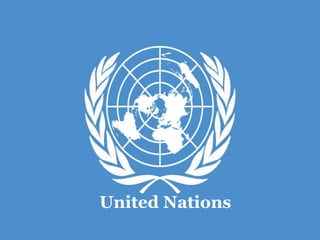
United Nations
- 2. Why was UN established? Disastrous Two World Wars Failure of League of Nations Division of world into Two Blocs Fear of Third World War Destructive weapons (atom/nuclear)
- 3. Origin 24 Oct, 1945 24th October is celebrated as United Nations Day. Head Quarters: NEW YORK, USA. 193 members by 2011. India an Original Member (first 50)
- 4. Aims/Objectives To maintain international peace and security Develop friendly relations among all nations To achieve international cooperation in solving economical, political, social & cultural problems. Encourage respect for human rights and fundamental freedoms Harmonizing the actions of nations to achieve the common goals.
- 5. Principles of UN UN shall not intervene in internal affairs of any State. All the members should settle their International disputes peacefully. All the members should stay away from use of Threat or Force against any State. All members should give UN every assistance in any action it takes. All the members should fulfill in good faith the obligations (responsibilities) assumed by them. Respect sovereign equality of all its members.
- 6. Organs/Committees (6) of UN 1. The General Assembly 2. The Security Council 3. The International Court of Justice (not in exam) 4. The Economic and Social Council (ECOSOC). 5. The Trusteeship Council 6. The Secretariat.
- 7. 1. The General Assembly (Main Organ- Decision making) Composition of General Assembly: All the members of UN are members of General Assembly. Each State has 5 representatives. However, each State has one Vote only. 3rd Tuesday of September every year the regular session starts which end in third week of December. Elects one President, 21 Vice Presidents and 6 Chairmen for Organs/Committees of UN
- 8. 1. The General Assembly (Main Organ) Powers & Functions of General Assembly: To DISCUSS and make recommendations about any QUESTION related to International Peace. To consider and approve BUDGET of UN and decide the contributions among members. To receive and consider REPORTS from Security Council and other organs. To make recommendations for peaceful settlement of disputes To elect Secretary General on recommendation of Security Council and together elect judges of International Court of Justice and non permanent members of other organs.
- 9. 2. The Security Council (executive body- maintain international peace & security) Composition of Security Council : Consists of 15 members. 5 Permanent Members: China, France, Russia, Britain and USA. 9 votes (including all 5 permanent members’ votes) are needed to take any decision. VETO POWER: negative vote of Permanent members is called as Veto.
- 10. 2. The Security Council (executive body) Powers & Functions of Security Council : To maintain International Peace and Security To take military action against an aggressor. To investigate any dispute/situation that may lead to International friction Recommend method to adjust/solve such disputes To recommend admissions of new members To recommend General Assembly appointment of Secretary General and together elect judges of International Court of Justice.
- 11. 3. International Court of Justice (to settle disputes legally and give legal advise) Composition of International Court of Justice: Seat @ Hague (Netherlands) Consists of 15 Judges elected for a term of 9 years. Not more than One Judge from One Nationality. Judges are elected by General Assembly and Security Council and are independent. Every 3 years election is held.
- 12. 3. International Court of Justice (to settle disputes legally and give legal advise) Powers & Functions of International Court of Justice : Parties: Only members can apply to appear before the court. Sources of Applicable Law: Cases are handled on the basis of international treaties, general principles of law and judicial decisions. Voluntary Jurisdiction: Court can help the States only if they bring the issue to the court. Compulsory Jurisdiction: Incase of- A large number of treaties are broken, disputes regarding interpretation of International law and reparation (compensation)
